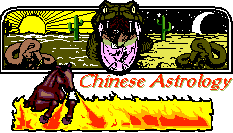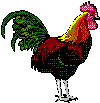 | ||
 | ||

The Chinese Calendar begins with 2637 B.C., the year which the legendary Emperor Huangdi supposedly invented it. This calendar designates years in cycles of 60. For example, 2000 is the 17th year in the 78th cycle. The years in each cycle are designated by by a word combination formed from 2 series of terms, one of which involves the name of 12 animals. These animals, in order they appear in the cycle are the rat, ox, tiger, hare, dragon, snake, horse, sheep, monkey, rooster, dog and pig.
As the Year of the Ox nears it's end, people the world over are preparing to celebrate the dawn of lunar year 4696, which begins January 28. This time, the spotlight is on the Tiger a fast-paced, dynamic animal long seen as a symbol of good luck. The animal is a common motif on ancient Chinese artifacts, including the stone carvings and bronze works of the Shang Dynasty (1766-1122 B.C.) and Chou Dynasty (122-221 B.C.).
The tiger's impact goes far
beyond royalty -- the animal is an object of appreciation in many people's daily lives. According to folk beliefs, wearing amulets and other accessories with tiger patterns will prevent disease. In northwestern China, children still wear handmade tiger-head shoes, bibs, caps and gloves. Tiger-patterned accessories are an important part of a bride's dowry, representing the birth of a new life.
To this day, many people maintain
a custom during the Dragon Boat Festival of hanging a good-luck tiger ornament braided from mugwort on their boats. Children wear amulets similar to the ornament during the festival, and parents paint the Chinese character for "king," representing the mighty tiger, on children's foreheads to protect them from harm.
In Taiwan, the tiger is a
popular image in religion and folklore. Images of dragons and tigers are often paired off on walls of temples, and a statue of the "Master Tiger," a deity incarnation of the animal, is usually placed under the altar. Many entertainers and gamblers believe that worshipping the Master Tiger will bring them fame or riches.
Chinese astrology says that
those born in the Year of the Tiger are independent, dictatorial, tough
and strong. They prefer to act alone, and they think highly of themselves. Such people are also thought to be able to tenaciously endure hardship, emerging triumphant in the end.
According to traditional
beliefs, the tiger represents power, dignity, bravery and leadership, yet can also be a symbol of evil, violence, danger and warmongering. What we make of it is up to us.
We invite you to click on the year of your birth.
 1936,1948,1960,1972,1984,1996
1936,1948,1960,1972,1984,1996
 1937,1949,1961,1973,1985,1997
1937,1949,1961,1973,1985,1997 1038,1950,1962,1974,1986,1998
1038,1950,1962,1974,1986,1998 1939,1951,1963,1975,1987,1999
1939,1951,1963,1975,1987,1999 1940,1952,1964,1976,1988,2000
1940,1952,1964,1976,1988,2000
 1941,1953,1965,1977,1989,2001
1941,1953,1965,1977,1989,2001
 1942,1954,1966,1978,1990,2002
1942,1954,1966,1978,1990,2002
 1943,1955,1967,1979,1991,2003
1943,1955,1967,1979,1991,2003
 1944,1956,1968,1980,1992,2004
1944,1956,1968,1980,1992,2004
 1945,1957,1969,1981,1993,2005
1945,1957,1969,1981,1993,2005
 1946,1958,1970,1982,1994,2006
1946,1958,1970,1982,1994,2006
 1947,1959,1971,1983,1995,2007
1947,1959,1971,1983,1995,2007

